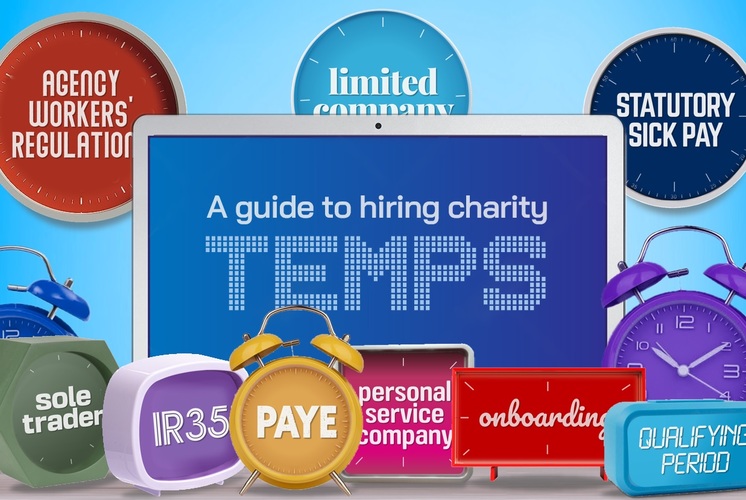
Worries about the cost of living aren’t just affecting physical and mental health, but also our ability to work, making a business case for shielding workers from the worst financial blows. But how can charities support their staff with financial wellbeing during an economic crisis, particularly when they may be struggling themselves?
Guest writer Nicola Greenbrook has been finding out, exploring how this can be done as part of a charity's overall wellbeing strategy.

What is the cost of living crisis?
We are facing the biggest cost of living crisis in a generation. According to The Institute for Government, the ‘cost of living crisis’ refers to the fall in ‘real’ disposable incomes (that is, adjusted for inflation and after taxes and benefits) that the UK has experienced since late 2021. The main cause of the crisis is levels of high inflation that outstrips wage and benefit increases, and it has been further exacerbated by tax increases.
The cost of living crisis continues to be a huge source of concern for many of us, as the price of food shopping, gas and electricity bills and fuel continues to soar. In addition, high customer demand, supply chain issues and Russia’s invasion of Ukraine have contributed to the sharp rise in costs. The Office for National Statistics (ONS) statistical bulletin Public opinions and social trends, Great Britain: 21 December 2022 to 8 January 2023 (released 13 January 2023) reports that 92% of adults consider the cost of living to be an important issue facing the UK today.
 |  |
How is it affecting us?
The effect is far-reaching. The impact on our personal finances is inevitable, and it is likely that more people will experience poor financial wellbeing, with lower income families shown to be most at risk. In its July 2022 report on the cost of living, the House of Commons Work and Pensions Committee said the greatest impact of increased costs was being felt by the poorest in society.
A significant hike in bills, food and the general cost of living means that, for many individuals, their monthly salary or annual pay rise is not sufficient to prevent serious financial detriment. The ONS reports that around 9 in 10 adults (93%) declared that their cost of living had increased compared with a year ago. Those who have seen their incomes squeezed and are struggling may be forced to rely on a quick fix to mitigate the financial pressures, such as a high-interest credit card or loan, which could lead to long-term, spiralling debt.
The cost of living crisis has also been linked to a reduction in wellbeing, and the British Medical Association considers the cost of living crisis to be a health crisis, as well as an economic one. Some individuals may be forced to cut back on the essentials needed to maintain their health; the absence of sufficient food could lead to malnourishment and living in a home that is not adequately heated could lead to the development of respiratory conditions or worsen existing ones, putting them at serious risk.
Mind reports that the cost of living crisis is also taking a huge toll on our mental health with increased anxiety and worsening mental health. It recognises that poverty and mental health problems have a two-way link; poor mental health can make earning and managing money harder, while worrying about money can worsen mental health. All too soon, this can feel like a vicious circle.
Finally, the CIPD’s Reward Management Survey (April 2022), reports that one in four employees say money worries affect their ability to do their job.
 |  |
How is the crisis affecting the charity sector?
Soaring costs are impacting households across the UK, but charities supporting people through the crisis are also feeling the consequences:
The ICAEW reports that rising bills are taking their toll across the sector, and the Charities Aid Foundation notes that 82% of charity leaders are concerned about how to pay their own utility bills. As more people rely on charitable support to survive the crisis, and find themselves tightening their budgets with less to give, many charities are seeing a fall in charity income due to the decline of public giving as noted by the NCVO’s CEO, Sarah Vibert.
Charity Excellence Framework reports that the ability for charities to meet demand and maintain service standards continues to decline and those at the front line of poverty, such as food banks and advice centres, are being hit hardest.
Finally, Charity Digital reports that charities are responding to the crisis in several different ways for themselves, their service users and society in general. This includes an increase in campaigning activities and calling upon key policymakers and parliamentarians to further support their service users, sharing advice via information hubs and considering more innovative ways to meet their service users' needs such as reframing the typical food bank. The charity also offers some suggestions on how charities can protect themselves from rising inflation.
 |  |
How can charities support financial wellbeing?
Some UK businesses have been able to offer a discretionary ‘cost of living bonus’ to mitigate the financial pressures, which can provide temporary relief, boost morale and reduce anxiety.
However, these incentives could set an unfair expectation or precedent among staff and affect some individuals in receipt of Universal Credit or Tax Credits.
So how can charities, particularly those not in a financial position to offer monetary incentives, support their employees and their financial wellness?

| Understand key concerns and priorities internallySoliciting feedback from your employees (via surveys, web chats or forums for example) on their own financial wellbeing and their views on your currently offered pay and benefits is a good place to start. This could help you to understand their key concerns and priorities and to communicate any existing initiatives that are already in place to support financial wellbeing, as well as devise an action plan for any future initiatives that could be introduced. | |
| Update your wellbeing strategy to include a focus on financial wellbeingAlongside your commitments to supporting physical and mental health, it would be beneficial to update your current wellbeing strategy to include financial wellness. The CIPD’S Reward Management Survey (April 2022) recommends the introduction of a financial wellbeing policy, and reports that employees whose workplaces have one in place are more likely to agree that their job protects them from poverty and that they feel in control of their finances. The policy could include information on how the charity supports financial wellbeing, a commitment to paying a fair and liveable wage or how to help your staff maximise their earnings. | |
| Build a culture of openness, support and understandingTry to encourage employees to talk about their money worries with HR, Mental Health First Aiders or their line manager if they feel they are able to, and empower them to feel heard and understood. Train your line managers to identify financial distress within their teams and signpost individuals to the correct place. It is not easy for most people to talk about money or finances, but this may go some way to alleviating some of the stress, and providing emotional support can go a long way. | |
| Signpost staff to financial education resources and supportCharities can support financial wellbeing by ensuring their staff have access to support and financial education resources, such an Employee Assistance Programme or other charities and organisations that provide advice and support on money management and debt. Some examples of this include the Citizens Advice cost-of-living information hub and resources from UK poverty charity Turn2Us. You may also consider asking your pensions provider or other money management specialists to deliver a presentation or talk about money matters during a lunchtime session. | |
| Review and communicate your benefits packageUndertake a review of your existing reward and benefits package to ensure it is fair, competitive and fit for purpose and ensure that your staff are fully aware of any cost-saving initiatives available to them, and how to access them, such as a cash plan or discounts at a gym. These can really help with saving each month and are a bonus if they are tied to physical exercise. | |
| Consider the addition of other benefits to support financial wellbeingProviding your staff with free access to mindfulness apps as part of your benefits offering could provide an extra layer of support. These apps can provide guidance, meditations and practical exercises to help people cope better with financial stress and create a more healthy relationship with money. Headspace has a mindful money toolkit that includes meditations and videos. |

As we continue to live through the crisis, employees are faced with critical financial challenges which can have a devastating impact on their day to day lives, health and work.
Employers have a crucial role to play in supporting their employees' financial wellbeing, and while charities may not have the funds to offer monetary help, there are nonetheless steps they can take to provide advice, information and support to help protect staff from poverty and mitigate against the most damaging effects of the cost of living crisis.
Nicola Greenbrook, London based freelance writer, podcaster and HR Specialist |
| ||
| | |

| | |||
| | | | |
-

Opportunity for all
Find out how we’re working to deliver more diverse, equitable and inclusive recruitment…
-

Recruiting a charity CEO?
Our executive recruitment specialists have an exceptional record of successful CEO, chair, trustee and…
-

Charity sector salaries
Check out the market rate for your charity role in the latest Harris Hill Salary Survey.













